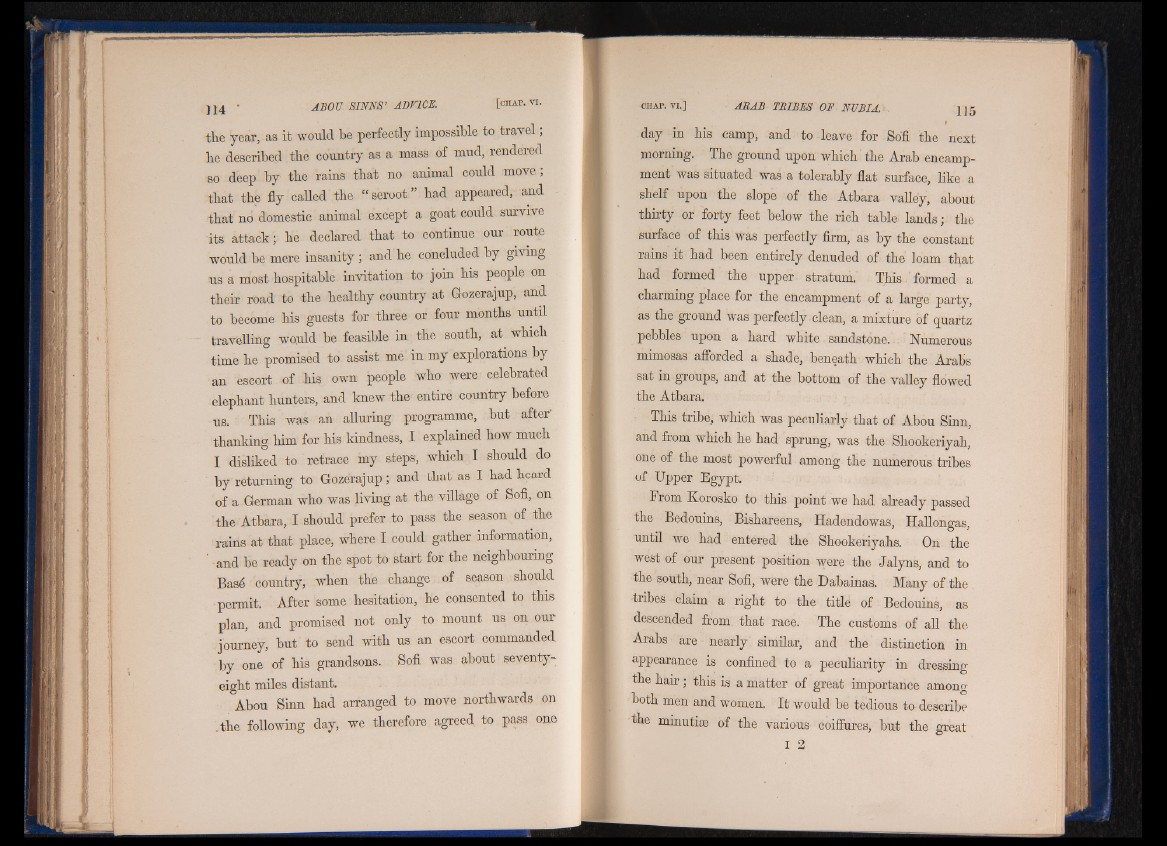
the year, as it would be perfectly impossible to travel ;
he described the country as a mass of mud, rendered
so deep by the rains that no animal could move ;
that the fly called the “ seroot ” had appeared, and
that no domestic animal except a goat could survive
its attack; he declared that to continue our route
would be mere insanity ; and he concluded by giving
us a most hospitable invitation to join his people on
their road to the healthy country at Gozerajup, and
to become his guests for three or four months until
travelling would be feasible in the south, at which
time he promised to assist me in my explorations by
an escort of his own people who were celebrated
elephant hunters, and knew the entire country before
us. This was an alluring programme, but after’
thanking him for his kindness, I explained how much
I disliked to retrace my steps, which I should do
by returning to Gozerajup ; and that as I had heard
of a German who was living at the village of Sofi, on
the Atbara, I should prefer to pass the season of the
rains at that place, where I could gather information,
' and be ready on the spot to start for the neighbouring
B a sé country, when the change of season should
permit. After some hesitation, he consented to this,
plan, and promised not only to mount us on our
journey, but to send with us an escort commanded
by one of his grandsons. Sofi was about seventyeight
miles distant.
Abou Sinn had arranged to move northwards on
.the following day, we therefore agreed to pass one
day in his camp, and to . leave for Sofi the next
morning. The ground upon which the Arab encampment
was situated was a tolerably flat surface, like a
shelf upon the slope of the Atbara valley, about
thirty or forty feet below the rich table lands; the
surface of this was perfectly firm, as by the constant
rains it had been entirely denuded of the loam that
had formed the upper stratum. This formed a
charming place for the encampment of a large party,
as the ground was perfectly clean, a mixture of quartz
pebbles upon a hard white sandstone. Numerous
mimosas afforded a shade, beneath which the Arabs
sat in groups, and at the bottom of the valley flowed
the Atbara.
This tribe, which was peculiarly that of Abou Sinn,
and from which he had sprung, was the Shookeriyah,
one of the most powerful among the numerous tribes
of Upper Egypt.
From Korosko to this point we had already passed
the Bedouins, Bishareens, Hadendowas, Hallongas,
until we had entered the Shookeriyahs. On the
west of our present position were the Jalyns, and to
the south, near Sofi, were the Dabainas. Many of the .
tribes claim a right to the title of Bedouins, as
descended from, that race. The customs of all the
Arabs are nearly similar, and the distinction in
appearance is confined to a peculiarity in dressing
the hair; this is a matter of great importance among
both men and women. It would be tedious to describe
the minutiae of the various coiffures, but the great
I 2